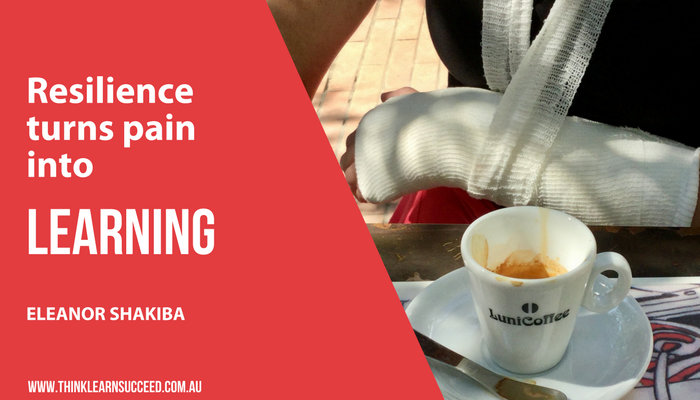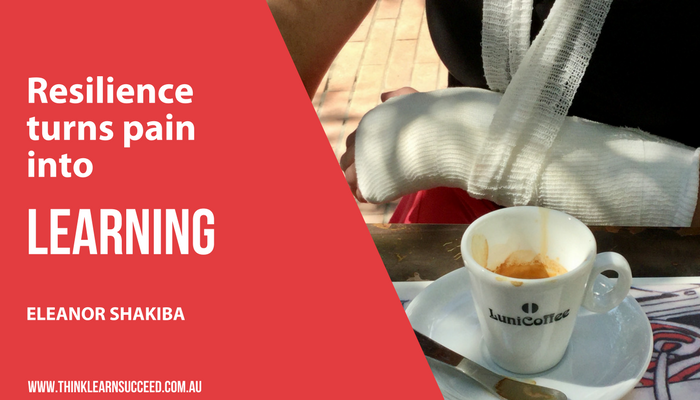
I’m not a big fan of tourist buses, so I decided to take the local bus to Portofino. This proved to be a bad decision. The bus was overcrowded, and I was squashed into the space next to the door. My arm was trapped when the door opened resulting in a fractured elbow and risk. In some ways, my visit to the Italian hospital was even more traumatic than the accident itself. In the long months of recovery and rehab though, I learned some valuable lessons in resilience. I’ve always been fascinated by the psychology of resilience. After all, resilience is what allows us to bounce back after traumatic or negative experiences. My accident certainly gave me an opportunity to test my practical application of what I’ve learned through all my years of studying this field. Five unexpected lessons emerged from my mishap.
Lesson 1. There’s a difference saying you’re going to slow down and actually doing it. For years, I’ve been advocating the benefits of taking a relaxed and mindful approach to work. Meanwhile, I was getting up at 5:00 am to write chapters of books before going to the gym and then travelling through Sydney traffic to run workshops or coaching sessions. Hardly what you describe as a slow lifestyle. The broken risk stopped me in my tracks, because I could no longer drive. This meant no more ad-hoc stop-offs at the shops on my journey home. No more unnecessary coffee meetings. And even better, no more gym. Eliminating the run around from my routine had a huge impact on my energy and focus.
Lesson 2. Just because you can do something, doesn’t mean you should. I’ve always been stressed by driving. It wasn’t until I was forced to use a driving service that I realised, just how much tension navigating through Sydney streets and circling buildings looking for carparks creates for me. During my enforced chauffer driven period, I discovered that I am a far better trainer and facilitator when the burden of driving is taken from my shoulders. I’ve decided driving is definitely not a strength of mine and is, therefore, going to be minimised in my everyday life.
Lesson 3. Introverts drive when they create quiet space. In the early stages of my recovery, I had no energy spare for catch up, phone calls, lunch dates or ad-hoc meetings. I retreated to my office where I discovered my creativity had increased dramatically, now that I have time to get into an uninterrupted flow state. The lesson I have taken from this is that I would do my best work when I give myself adequate introversion times.
Lesson 4. If you heard the same message more than three times, take it seriously. For years, people have been telling me that I should take up yoga. Addicted to adrenaline and action, of course, I ignored them. Yin yoga turned out to be the only sort of exercise I could do during my rehab months. I discovered it makes me feel much better than my sessions at the gym ever did. If only I’ve listened to all those unheard advice over the years.
Lesson 5. Don’t just teach delegation skills, use them. Having only one hand meant I was often literally working at half pace. This meant I had to hand time-wasting tasks to other people. In particular, I learned to step away from my computer and administrative tasks, such as responding to logistics emails, has now been handed over to my team. Again, I have reaped creative benefits from this simple change of habit. The time I used to spend on admin is now being spent on creative projects. Overall, I definitely wouldn’t want to repeat the experience. However, it certainly turned out to be a rich source of experiential learning. I am grateful that my interest in positive psychology, had set me up to handle this situation with resilience and a solution focussed mindset.
About the author of these tips
Eleanor is a trainer and coach. She consults to a range of sectors – including higher education, health, finance and local government – in the development of social and emotional intelligence at work. Eleanor has been running training and coaching sessions for people in high intellect professions since 1994. She is qualified in Social Anthropology, Applied Psychology, Adult Education and Neuro Linguistic Programming.

